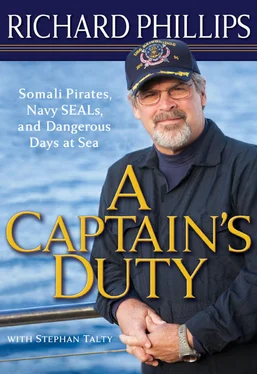“You have a problem,” I said.
Andrea thought, Well, he’s cute enough. I’ll play along.
“What’s that?” she said.
“Being the best-looking woman in every room you walk into.”
“Thanks,” she said. “There are three women in here. Not a huge compliment.”
I laughed and stuck out my hand.
“I’m Rich,” I said. “As in ‘filthy.’” That was one of my better lines in the early eighties.
Andrea cracked up. Then she let me buy her a drink.
Years later, after we were married, Andrea told me that she thought I was funny and easy to talk to. Like most people’s, her only knowledge of the merchant marine came from Humphrey Bogart movies. I guess that’s why she let me tell her so many stories. “You made it sound intriguing,” she said.
After we met, I had to ship out and Andrea didn’t hear from me again for months. She moved to a new apartment after her first year at nursing school. Then one night at about 1 a.m., there was a rap on her door. When she opened it, there I was, smiling like I’d won the lottery. She was floored. She figured I must have walked all over Boston, trying to find her new address. She wasn’t far off.
Andrea was twenty-five and very focused on school. Nursing was going to be her life. I was on her radar, but only a blip on the edge of the screen. I would ship out and she would get postcards and then letters from these ports all over the world. Then I’d come back to Boston and take her out to dinner and the movies and pick her and her friends up at seven a.m. the next morning and drive them to their first classes. All the while, I’d have a new batch of stories to tell her about storms off Cape Hatteras or typhoons or good or crazy shipmates.
To me, it was just life on the seas. But she loved getting the postcards and the sudden reunions. “It was romantic,” Andrea says to this day. “It really was.”
The night before I shipped out for the Maersk Alabama, Andrea and I jumped in our car and went to our favorite restaurant, a place called Euro, in the nearby town of Essex. Andrea had the shrimp scampi and I had the seafood medley and we drank a bottle of red wine we brought with us. It’s cheaper that way. I’m three quarters Irish and one quarter Yankee, but that one quarter controls the money. I’ve been known to be tight with a dollar, and I don’t mind saying so.
The next day, March 28, Andrea dropped me at the airport, like she always did. There was nothing out of the ordinary in those last hours together. “Everything is going to be fine,” I said. “I’m sure you’re going to get a blizzard as soon as I leave, so just think of me lounging on deck in the hot sun.” I love snow. There’s nothing I like more than looking out my back window at the fields and trees covered in white. She laughed. “See you in June,” she said and gave me a kiss. She usually stays until my flight leaves; that’s a tradition that started when Mariah and Dan were young. They would stand at the window watching my flight take off and wave at their daddy, just milking that last moment of togetherness for everything it was worth. But the kids were in college now and Andrea was on her way to work and she couldn’t wait. It was the first time that ever happened. I thought about that later.
I love the sea and being a merchant mariner, but you meet a lot of oddballs on ships. I think a lot of it has to do with leaving people behind for so long. It can mess up your head. Marriages break up. Girlfriends find new guys. Sailors get “Dear John” e-mails in the middle of the night on some lonely stretch of water miles from anywhere. Sometimes, a crew member will disappear, just jump overboard in the middle of the ocean, never to be found. A lot of it has to do with the strain that comes from being away from loved ones.
Merchant mariners always talk about Jodie. Jodie’s the guy who’s at home screwing your wife while you’re out on a ship. He’s eating your food, driving your car, chugging your beer. Jodie’s going to be sitting on your couch when you arrive home, asking, “Who are you?” When a guy calls his wife and she doesn’t answer, we tell him, “She’s out with Jodie.” As much as we joke about it, Jodie is all too real. Guys get home and their apartment is cleaned out, their bank balance reads zero, and their fiancée is gone without leaving a note. It happens to some sailors over and over again. Every time I heard about Jodie it made me feel more thankful that I had Andrea at home. Jodie never visited my house.
But I’m not going to lie, some sailors just start out crazy—especially the cooks. I’m convinced there are very few normal, well-adjusted cooks in the entire U.S. Merchant Marine. Not one, except for my brother-in-law, Dave. But you do have your share of eccentrics among the rest of the crew, too. I’ve served under an old-salt captain named Port-and-Starboard Peterson who in fog as thick as pea soup would refuse to use radar because it would hypnotize you into crashing into another ship . The radar was evil, you see. One guy wore half a mustache for an entire three-month trip. Another demanded to be called Polar Bear when we sailed toward the North Pole and Penguin when we went toward the South Pole. This guy collected so many T-shirts from the different ports that you could barely push open the door to his quarters. I knew another seaman who showed up at the boat wearing a wolf-skin coat with the head still attached. Sailors are a breed apart, that’s for sure.
It’s been that way forever. The merchant marine is the first of the nation’s services. We were founded in 1775, before the army and the navy. In all our wars, including World War II, guys who just couldn’t live with the navy’s regulations ended up onboard cargo ships. They didn’t see the point of having a crease in their dungarees or saluting every officer onboard; they just weren’t made that way. It’s no accident that many of the Beat writers like Jack Kerouac and Allen Ginsberg were former seamen. The need to wander and the need to rebel go hand in hand. We’re a bunch of misfits and renegades and damn good seamen.
When I’m taking ships from port to port, books on the history of the merchant marine or World War II are always piled by my bunk. We were the first to die in World War II—seventeen minutes before the attack on Pearl Harbor, a Japanese sub strafed the lumber hauler SS Cynthia Olson and sank it, over 1,000 miles north of Honolulu. Thirty-three sailors jumped into lifeboats but were never seen again, because all hell was breaking loose on navy ships a thousand miles away. And the merchant marine suffered more casualties than any other service in World War II. One in every twenty-six sailors died while doing his duty. Crewmen torpedoed along the Atlantic coast drowned in engine oil while sun-bathers watched from the shore. Men in the North Atlantic froze solid to the floors of their lifeboats after their tankers went down. Enormous five-hundred-foot ships carrying ammunition and dynamite to the front lines were torpedoed, blowing up in explosions so violent they never found a trace of the tons of metal or the hundreds of men aboard. They just disappeared into thin air. Which is fitting, really. The merchant marine has always been the invisible service, the guys who brought the tanks to Normandy, the bullets to Okinawa, but no one ever remembers us. What General Douglas MacArthur said was true: “They brought us our lifeblood and paid for it with their own.”
But when the boys from the cargo ships went home, there were no ticker-tape parades, no G.I. Bill, nothing like that. They’re still trying to get recognition so they can live out their lives with dignity. There’s a bill before Congress that will guarantee them standing as World War II veterans and pay them a small stipend, but it’s taking so long to get through the political process that most of the guys will be dead before it’s passed. That’s a shame.
Читать дальше












